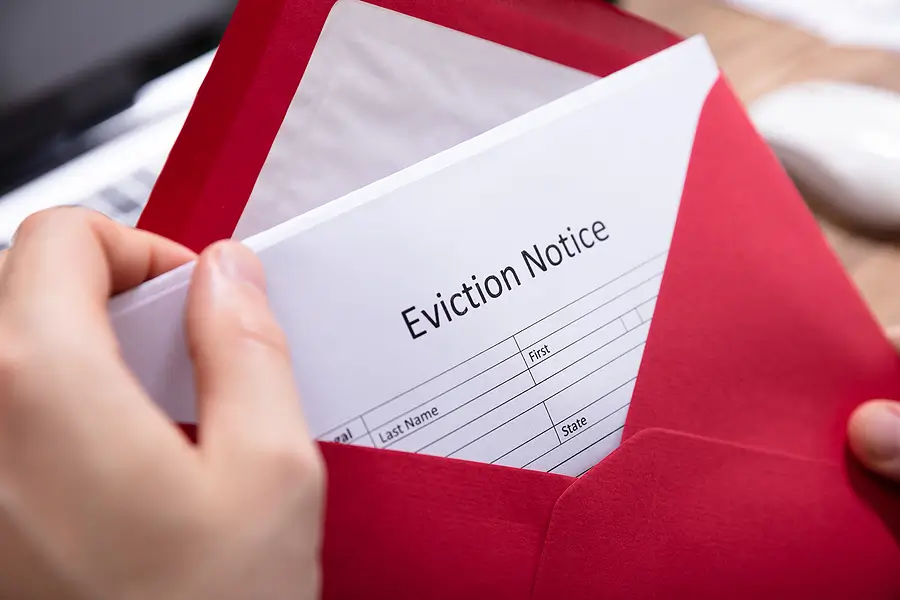Dealing with eviction can be one of the most difficult aspects of managing rental properties. In Kansas, landlords must follow specific procedures to ensure the eviction process is handled legally and efficiently. If you're a landlord in Kansas, it's crucial to understand the eviction process, from giving proper notice to attending an eviction hearing. This blog will help you navigate the eviction process step by step, so you can stay compliant with local regulations.
Understanding the Eviction Process in Kansas
The eviction process in Kansas begins with understanding your rights and responsibilities as a landlord. Whether a tenant is not paying rent, violating the lease agreement, or causing damage to the rental property, you must follow a legal process to evict them from the rental property.
When facing eviction, the first thing you must do is issue a written notice. The type of notice depends on the reason for eviction. If a tenant is behind on rent, landlords typically issue a 3-day eviction notice to pay rent or vacate the premises. If the tenant has violated other terms of the lease agreement, the notice could give them more time to remedy the issue.
It's important to remember that you must provide the proper notice according to Kansas law. If the tenant does not comply with the notice, the next step in the eviction process involves filing a formal eviction case in court.
Issuing the Written Notice
The first step in the eviction process is always the written notice. Kansas law requires that landlords provide a written notice that outlines the reason for eviction. In cases of non-payment, landlords must issue a 3-day eviction notice to pay or vacate. For other lease violations, the landlord must follow the terms of the lease agreement and provide the tenant with appropriate notice.
The eviction notice must be given in person, by certified mail, or posted on the tenant’s door. This ensures that the tenant is informed of the situation and understands the consequences of failing to take action. Keep in mind that the written notice must include the date by which the tenant must either pay the outstanding rent or vacate the rental property.
Filing an Eviction Case
If the tenant has not complied with the written notice, you must proceed to file an eviction case in court. This involves submitting a complaint to the district court, which starts the court process. Once the court has received the complaint, a court date will be scheduled, typically within 10 to 30 days.
It’s essential to have all documentation in order, including the lease agreement, proof of unpaid rent or lease violations, and records of the eviction notice. Court rules require landlords to present a compelling case in front of a judge. If the tenant has not responded or failed to attend the eviction hearing, the landlord can request a court order to evict the tenant.
Attending the Eviction Hearing
The eviction hearing is an essential part of the court process. During this hearing, both the landlord and tenant will have the opportunity to present their cases. The landlord must show that they followed the proper procedure, including providing the proper notice and complying with the lease terms. If the tenant did not attend the hearing or cannot provide a defense, the landlord is likely to win the case.
If the judge rules in favor of the landlord, a court order will be issued, and the tenant will be legally required to vacate the property. If the tenant remains in the rental property after the court order, the landlord must seek assistance from local law enforcement to physically evict the tenant.
DO NOT attempt to remove the tenant yourself, this must always be done by a law enforcement officer.
Dealing with Non-Payment of Rent
One of the most common reasons for an eviction case is non-payment of rent. If a tenant has not paid rent, landlords must give them the opportunity to either pay or leave. The eviction notice must give the tenant a minimum of 3 days to make payment before moving forward with legal action. If the tenant does not pay within that time, the landlord can move forward with filing the eviction case.
It’s important to note that some tenants may be eligible for rental assistance programs, especially if they are facing financial hardship. You should always check with the state government or local housing authorities to ensure that the tenant has access to available rental assistance before proceeding with the eviction process.
The Importance of Following the Lease Agreement
A lease agreement is a binding document between the landlord and the tenant. It outlines the expectations and responsibilities of both parties. If a tenant violates the lease agreement, such as by causing damage to the property or engaging in illegal activities, the landlord must follow the eviction process to evict the tenant.
If the tenant violates the lease agreement, you can issue a written notice that specifies the violation and demands that the tenant vacate the property. In cases where the tenant fails to comply with the written notice, the landlord can proceed with filing an eviction case.
How to Handle Lease Violations
When it comes to lease violations, landlords have the right to issue an eviction notice if the tenant does not remedy the situation. Common lease violations include unauthorized pets, damage to property, or engaging in illegal activities on the premises.
If the landlord wishes to evict a tenant for violating the lease agreement, the landlord must give the tenant a proper notice that includes the specific violation. If the tenant fails to address the issue within the given timeframe, the landlord can file an eviction case.
Avoiding Common Pitfalls in the Eviction Process
Evictions can be a complicated process, and you must be careful to follow every step to avoid costly mistakes. Some common court issues include failing to provide proper notice, not having adequate documentation, or not attending the eviction hearing.
To ensure a successful eviction process, you should carefully document all communication with tenants, including the eviction notice and any responses. They should also familiarize themselves with court rules and ensure they have the required evidence to present in court.
Why Partner with Oz Accommodations?
The eviction process can be stressful, but by following the proper legal steps, you can protect your rental property and ensure you remain compliant with Kansas laws. If you find yourself in need of assistance with eviction, consider working with a trusted property manager who can guide you through the process.
At Oz Accommodations, we specialize in managing Kansas rental properties and can help ensure your eviction process runs smoothly and efficiently. We can assist with all aspects of rental property inspections, maintaining compliance with local regulations, and handling eviction cases. If you want more information on how we can assist you, please visit our services page today!


